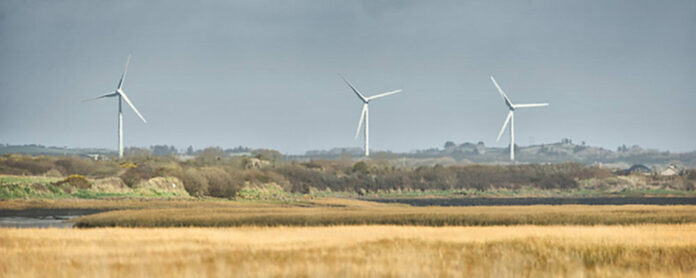Renewables developer says legislators need to facilitate the change from fossil fuels
CLARE’S renewable energy potential has been described as “a huge, massive, endless, sustainable resource,” with the capacity to provide thousands of jobs and funding for vital public services.
Barefield native Padraig Howard, a renewable energy developer believes that Clare’s on- and off-shore resources have the same transformative potential that the oil and gas sectors had a century ago.
The difference is their green credentials and limitless supply. He told The Champion that while the development of the sector is “glacially slow”, the urgency of the climate crisis and the job creating potential of renewables is likely to push the sector to the top of the political agenda.
Mr Howard, whose company developed the Mount Callan Windfarm, among others, highlighted Intel’s interest in Oranmore as a prime example of the potential of green energy to attract industry.
“Oranmore is on a shortlist alongside a site in German and one in Poland,” he outlined.
“If Intel could be provided with a zero-carbon electricity supply from an off-shore source, with the price guaranteed for 40 years, that would be a massive incentive to locate a €16 billion project in the West of Ireland.
“Not only would it boost the economy of Galway with a huge number of high-end jobs, it would be an absolute classic example of what can be done in terms of renewable energy supply for big business.
“Once the world’s executives see that, they’ll be sure to follow and establish operations along the western seaboard. This could be game changing. The potential is absolutely huge.”
Mr Howard first got interested in renewable energy in the mid-2000s and said that while Clare was quick to move into the sector, it has since fallen behind in terms of policies to promote green power.
“When we started to highlight the potential of the renewables sector around 2006, there was really no recognition that Clare had such huge potential,” he said.
“Back then, we outlined an industry potentially worth €1 billion. Since then, €800 million has been invested, not all of it by us, but that’s the scale of the opportunity.
“We have made a massive leap forward and we’re only at the start of it.
“We need to ensure Clare is established as a place where people accept the development of renewables and where that is supported by the County Development Plan.
“At first, Clare was leading the way in terms of policies and our Plan was considered best-in-class. It was copied by counties like Kerry, Mayo and Donegal who have since streaked ahead of us and we’re lagging behind.
“One hundred years ago, there was the vision to create Ardnacrusha and the Shannon Scheme, a world-scale project. Clare has the same potential today in renewables.”
Mr Howard added that while there is a growing realisation that we must switch focus from fossil fuels, the pace of policy and planning change is too slow.
“Most logical people have come to the realisation that we cannot continue on the path of using coal, oil and gas,” he said.
“Change has to happen. The European Court of Justice recently told a Dutch oil company that it must change its path. That means that the money that previously went into oil and gas is now diverting into renewables.
“The issue now is that local authorities and civil servants and politicians need to see this. There is capacity here to derive huge benefits for communities and for individual counties like Clare.
“The ship has turned on the move to low-carbon societies and economies, we’ve got to make sure that the counties, like Clare, where the renewable resources are, get the maximum benefit.”
There are many issues currently standing in the way of development, Mr Howard believes, not least of these, the process of securing planning permission.
“It’s a long road,” he said. “You would need the patience of Job and a lot of perseverance. Getting projects across the line is a slow and arduous process.
“To my mind, most people involved in the renewable sector are motivated by the climate crisis. The business rewards are slow and there are a lot of risks, but the potential for communities is absolutely huge.”
Acknowledging the controversy around a number of active planning applications in Clare, Mr Howard said developers are not attempting to stop public consultation.
“We don’t want to keep the public out of the process, of course not,” he insisted.
“Unfortunately, in some cases the issue of seeking permission has turned toxic. Things have become divisive. The debate has become very polarised.
“For that reason, local authorities and politicians seem to be reluctant to go out and attract industry on the promise of green energy. There has been a change-of-heart and that’s a pity.
“We do need to reform the process and if people could be invited to a regional plebiscite to vote on renewable energy plans for their own area, then that would go a long way to changing things.
“There is potential for Clare to be at the pinnacle in terms of renewable energy with wealth and jobs for citizens and funding to support health and education services.”
On the Eirgrid warning of potential power outages, Mr Howard said the issue had the potential to prompt important conversations.
“Nobody considers where their power comes from when they flick the switch,” he said.
“Outages are possible, but they’re highly unlikely. However, the risk of them could prompt people to have a conversation and to look at what they want for the future and the potential that is there for counties like Clare.”


